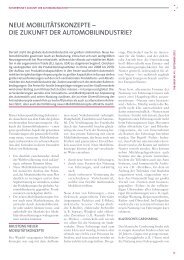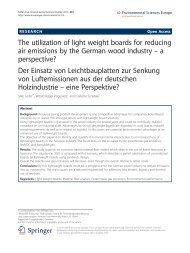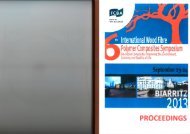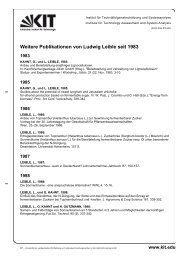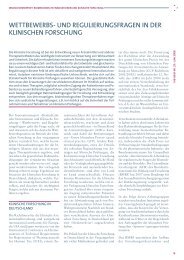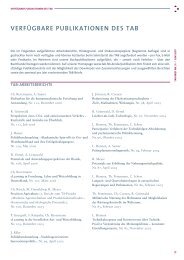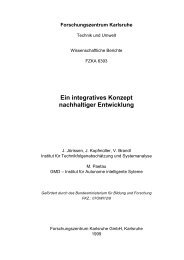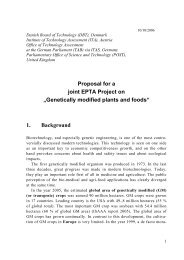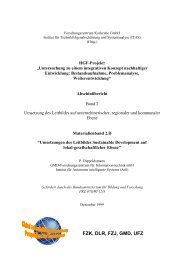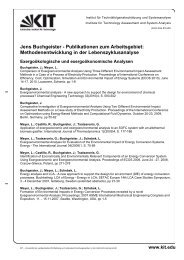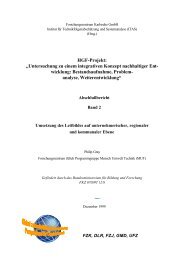Results: RFID and Identity Management in everyday life - ITAS
Results: RFID and Identity Management in everyday life - ITAS
Results: RFID and Identity Management in everyday life - ITAS
Create successful ePaper yourself
Turn your PDF publications into a flip-book with our unique Google optimized e-Paper software.
Go<strong>in</strong>g to work: access <strong>and</strong> presence<br />
The work<strong>in</strong>g environment is perhaps a sett<strong>in</strong>g where we can see some of the oldest applications of<br />
<strong>RFID</strong> for <strong>Identity</strong> <strong>Management</strong>. In the last decade many offices have switched from the normal iron<br />
keys or magnetic cards to <strong>RFID</strong>. Surpris<strong>in</strong>gly very few studies exist of <strong>RFID</strong> use <strong>in</strong> this area. One<br />
exception is a study from the RAND corporation on five large offices <strong>in</strong> the US. Their accounts<br />
demonstrated that none of them used <strong>RFID</strong> merely as a key. Although the systems were put <strong>in</strong>to place<br />
by the security departments <strong>and</strong> managed as such, other departments soon took <strong>in</strong>terest <strong>in</strong> the<br />
<strong>in</strong>formation gathered, such as Human Resources, the legal department <strong>and</strong> l<strong>in</strong>e management.<br />
[Balkovich et al, 2005: p.12] Many functions were added, such as time registration, as we will see <strong>in</strong><br />
our European cases too.<br />
At the NWO office [case #96] <strong>in</strong> The Hague, the Netherl<strong>and</strong>s people are still learn<strong>in</strong>g that the small<br />
plastic token they hold is not just a key, although it appears to be at first sight. On enter<strong>in</strong>g their office,<br />
they go through several doors which are secured with an electronic lock: from the underground car<br />
park, to the elevators <strong>and</strong> on each floor. Readers are placed next to the door h<strong>and</strong>le. The <strong>RFID</strong> tag can<br />
be read when it is held less then a centimetre from the reader. The unique code is sent to the database,<br />
which checks whether the token can provide access. If it does, the door opens, if it does not, the door<br />
rema<strong>in</strong>s closed <strong>and</strong> the system operator receives a signal on his screen. At every read<strong>in</strong>g the follow<strong>in</strong>g<br />
<strong>in</strong>formation is stored <strong>in</strong> a central database for an unlimited time: door, department, time of entry <strong>and</strong><br />
name of employee.<br />
This key function is extended by the possibility of differentiat<strong>in</strong>g levels of access. Token holders can<br />
be given access just on the route to their place of work from 7.30 up until 19.00 <strong>and</strong> some of the<br />
general facilities such as the canteen. Access can be extended at the central database: allow<strong>in</strong>g<br />
personnel to also visit offices of other organisations <strong>in</strong> the build<strong>in</strong>g, or get access beyond the time<br />
limits. We discovered a lively trade evolved around this extension, especially between different<br />
organisations resid<strong>in</strong>g <strong>in</strong> the build<strong>in</strong>g. In our <strong>in</strong>terviews, the system adm<strong>in</strong>istrator appeared quit strict<br />
about the rules: only permanent staff can get the key, with fixed level of access. However, the system<br />
operator, who has access to the database appeared to be more flexible, demonstrat<strong>in</strong>g <strong>Identity</strong><br />
<strong>Management</strong> is not quite fixed, but negotiable.<br />
Many people succeeded <strong>in</strong> obta<strong>in</strong><strong>in</strong>g additional tokens for temporary staff, although this is not<br />
allowed. Also, one head of facilities conv<strong>in</strong>ced the system operator to br<strong>in</strong>g her own access level up to<br />
a higher grade <strong>and</strong> that of others down, provid<strong>in</strong>g her with access to all other offices, while she got all<br />
other personnel from other offices rejected - even the service people who needed to access the office<br />
for ma<strong>in</strong>tenance. Another employee also turned out to have extended access: this was revealed when<br />
staff were hav<strong>in</strong>g a celebratory dr<strong>in</strong>k down the hall one day <strong>and</strong> they discovered they could not enter<br />
their offices aga<strong>in</strong> because it was past 19.00. To everyone’s surprise this employee’s token opened all<br />
doors while others were locked out, even the director of the organisation.<br />
In our time <strong>in</strong> the office, we asked several people on what they thought of the system. Almost all of<br />
them were surprised to f<strong>in</strong>d out their check <strong>in</strong> time was registered <strong>and</strong> assumed the system to be<br />
noth<strong>in</strong>g more than an access system. The System Operator also told us an <strong>in</strong>terest<strong>in</strong>g story on one<br />
employee who discovered that the token is more than just a key. His colleagues <strong>and</strong> supervisor saw<br />
him leav<strong>in</strong>g quite early every day, while he claimed he also started very early when others were not<br />
there. The supervisor then went to the system operator <strong>and</strong> requested a table of check-<strong>in</strong> times of this<br />
employee. The data were <strong>in</strong> fact show<strong>in</strong>g the staff member did not always start as early as he claimed<br />
to. The system adm<strong>in</strong>istrator however refutes this story, reclaim<strong>in</strong>g the primary function of the system:<br />
access, not time registration. Still, a database adm<strong>in</strong>ister<strong>in</strong>g the whereabouts of all staff, may prove to<br />
be too valuable to be merely used as an access system.<br />
13



